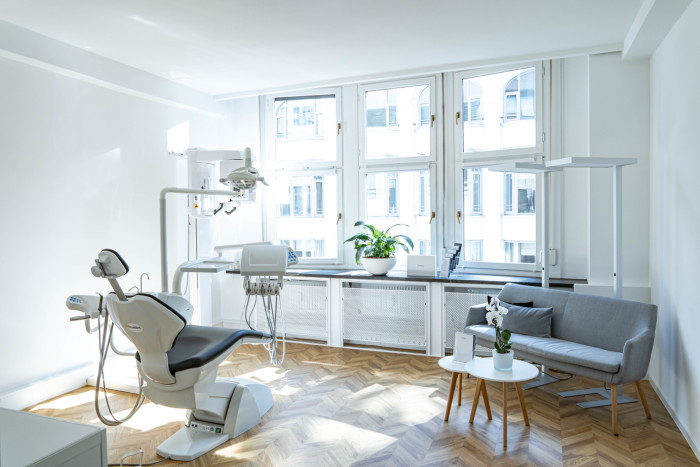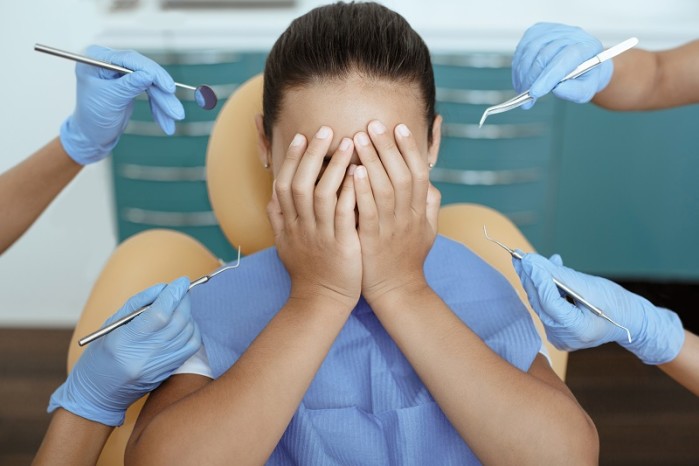Overcoming your fear of the dentist: how to conquer your fear

Fear of the dentist is not just a common problem among children. Even adults can be afraid of going to the dentist. They consider every visit to the dentist to be an uncomfortable and life-threatening situation that they'd rather just avoid. But the fear of the dentist has a rational basis. After all, who likes to open their mouth to let strangers poke around in there with sharp tools? But there's a decisive difference or distinction between regular aversion to the dentist and outright fear, which is accompanied by extreme emotions and a state of panic in patients with anxiety. In our dental phobia guide, we let you in on why so many people experience fear of the dentist, how to overcome it, and what else anxious patients should pay attention to.
Why are so many people afraid of the dentist?
Dental phobias can stem from varying origins and are not always automatically associated with traumatic childhood experiences at the dentist. Of course, painful experiences from one's past or the so-called anticipatory anxiety ahead of injections or pulling teeth are possible triggers for an extreme case of dental phobia. But a frightening image can also be seared into the subconscious of the anxious patient through negative interactions linked with dentists and teeth by people who are close to them. Dental phobia is correspondingly a widespread phenomenon and the affected anxious patients often combine their dental phobia with shame of insight, which is why a recurring feeling of being exposed and helpless is not uncommon.
How is 'anxious patient' defined?
By definition, anxious patients suffer from intense emotional conditions that can take on such proportions that is becomes impossible for the anxious patient to act reasonably, at which point the fear of the dentist takes over. Even then, the patient is generally fully aware that treatment is necessary for their teeth, however, due to their extreme emotional state, their plan falls apart even as soon as they step foot in the clinic. Similarly, affected persons experience wide-ranging symptoms that can run the gamut from nausea to heart palpitations and sweating to increased bowel movements. Anxious patients develop a pronounced repression mechanism over time, which ultimately makes dental treatment almost impossible.
However, as with other dental problems, patients with anxiety should also contact their dentist for annual check-ups to prevent or treat possible risks and dental diseases with the help of regular exams.
Fear of shots at the dentist's practice
Whether it's the anaesthetic before wisdom tooth surgery or the injection during drilling - for anxious patients, the fear of an injection at the dentist is impossible to overcome and represents a hellish ordeal for them. However, even patients with anxiety cannot avoid injections for certain dental procedures and have to face their panic fear, for better or for worse. Today, many dental practices already specialise in patients with anxiety and offer patients with a fear of injections near-painless procedures due to super-fine needles. The anaesthetic also takes effect immediately due to the high pressure of the super-fine syringes. Another advantage of anaesthesia with thin syringes is the small amount of anaesthetic that is injected, which means that there is hardly any numbness. However, methods such as hypnosis or sedation with nitrous oxide also offer patients with a fear of injections at the dentist an alternative treatment procedure that makes the visit to the dentist much easier.
Bad teeth – but afraid of the dentist
Just as the fear of the dentist develops slowly in some patients and can remain undiagnosed initially, there are also anxious patients who do not want to admit to their extreme fear of the dentist. As a result, they develop a strong defence mechanism over time, which affects not only the condition of their teeth but also their emotional state. Due to this, patients with anxiety usually experience deteriorated dental health. Although the affected person is often aware of the need for treatment, especially if their teeth are getting worse due to avoiding going to the dentist over a longer period, the fear of the dentist prevails even in cases of severe toothache. Patients experiencing anxiety ultimately put off making a dentist appointment for so long that treatment becomes necessary—a genuine vicious cycle!
HELP FOR TOOTHACHESWhat can be done about panic at the thought of going to the dentist?

If adults suffer from heightened anxiety when going to the dentist, here are some tips to counteract that fear. First and foremost, it's a good idea to go to a dentist who specialises in working with anxious patients. That means it is very important to talk with your dentist. Because even before the treatment begins, open communication about your dental phobia and an understanding approach to the topic can help calm you down and make the upcoming procedure easier for you. Here are some tips to counteract your fear of the dentist that can help you stay calm during treatment:
1. Autogenic training:
Autogenic training can help you overcome your fear of dentists. Relaxation therapy involves composing calming phrases in one's mind. This has a very relaxing effect, because it has been proven to improve the regulation of blood pressure and heartrate. By concentrating completely on the sentences, which are recited repeatedly in your head, fear becomes secondary and the procedure loses its capacity to instil fear.
2. Hypnosis:
Hypnosis is another tip to combat panicked fear of the dentist. Similar to autogenic training, certain hypnosis techniques can help to overcome fear. There are now also many dental practices that offer hypnosis and specialise in anxious patients.
3. Meditation and imaginary journeys:
Meditation offers another relaxation technique. As is the case with autogenic training: practice makes perfect! If you still find it difficult to meditate before a visit to the dentist, try imaginary journeys. These can help you to mentally escape from the room where your treatment is taking place and can definitely help against the fear of the dentist. However, if the meditation is done correctly, nothing stands in the way of relaxation in the treatment chair.
4. Shut noises out:
Music and audiobooks can help mask or shut out the generally unpleasant soundscape of dental implements. It also helps distract your attention from the actual treatment.
5. Psychotherapeutic treatment:
It has been proven that psychotherapies for dental anxiety can be extremely effective and, with a success rate of 70%, are usually recommended as the first entry point for fear of the dentist. Using certain methods, confrontation techniques, and relaxation techniques, you can treat the root cause of your fear. As such, psychotherapies for extreme dental anxiety have the advantage of also bringing about long-term improvement. Furthermore, the costs for physiotherapy sessions are usually covered by public health insurance companies.
My child is afraid of the dentist — what do I do?
Children can also develop extreme dental phobia, for example, due to negative stories about the dentist from people in their environment. But painful experiences, such as milk teeth falling out or past examinations, can also increase dental anxiety. When children become distressed due to dental phobia, it is often helpful to seek out a paediatric dentist, who specialises in anxious patients. In these practices, a pleasantly designed atmosphere usually makes patients feel more comfortable and less agitated. Two-way communication about the individual treatment steps and the actual reason for the fear can also help dispel the child's concerns. If nothing helps, children with a fear of the dentist can still be given a general anaesthetic or sedation with nitrous oxide. However, both methods have risks and should only be used in an absolute emergency.
Tips for dealing with agitation
As a first step to alleviating dental anxiety, there are numerous tips and tricks to combat agitation. For example, there are a variety of teas that can have a calming effect on your emotional state and reduce your agitation in the first step for your upcoming dentist appointment. An equally common tip for agitation before a visit to the dentist is to take homeopathic remedies, such as globules. Similarly, in many cases of dentist-related anxiety, choosing a dentist who specialises in anxious patents can help. Because such a dentist takes enough time to address your concerns, communicates thoroughly in relation to your dental phobia, and gives clear instructions about how your treatment will be carried out. Bringing a support person is also a good trick to help combat becoming agitated. If you do become uncomfortable, your support person can talk you through your fear or just hold your hand.
Sedatives for dental phobia
Before you decide to take certain sedatives before your visit to the dentist, you should clearly communicate this with your dentist, to prevent any potential interactions. Common sedatives to treat dental phobia are benzodiazepines, for example, which provide for a short-lived sedation. But some pain medications (like analgesics) are a useful resource for anxiety and can be taken prior to dental treatments. Although sedatives are effective against anxiety at the time of the treatment by the dentist, they are not a long-term solution, as the fear of future visits to the dentist remains.
General anaesthesia for anxious patients
If none of the above tips is helpful against dental phobia, local or general anaesthesia can be used. As is the case with sedatives, anaesthesias are not a long-term solution to overcome fear of the dentist. However, general anaesthesia can be used for patients with dental phobia, in order to eliminate pain during extensive treatments and out-patient procedures and to remain calm.
Dentists for anxious patients
These days, there are many dentists who focus on anxious patients. If there is a case of dental phobia, you should certainly seek out a dental clinic that specialises in treating anxious patients. Generally, dentists who treat anxious patients have clinical spaces that are designed to be more attractive, where more emphasis is placed on friendly and sympathetic interaction with the affected person. Patients with anxiety will also not encounter the supposed smell of a dentist or a louder background noise here.
TIPS: FINDING A DENTISTDentists' costs for anxious patients
The costs for general anaesthesia during a dental treatment are only covered by the public health insurance providers if it is unavoidable, meaning only in cases of medical necessity. For this, patients with anxiety must have their dental anxiety confirmed, which is possible through a psychiatric certificate from the treating therapist. However, despite medical necessity, there are some points to consider in terms of cost coverage for anxious patients. The health insurance providers argue that they fulfil their obligation in cases of medical necessity by covering the costs of psychotherapeutic sessions. According to the health insurance companies, the therapeutic sessions must be effective as a medically necessary measure for patients with extreme dental fear. If that does not happen, they classify general anaesthesia as non-mandatory. If the psychotherapy does not produce an effect for anxious patients, the afflicted persons are left to shoulder the costs themselves. There are exceptions when it comes to replacing a tooth. In this case, patients with anxiety receive a 50% subsidy from the statutory health insurance (gesetzliche Krankenversicherung, GKV). For privately insured anxiety patients, cost coverage depends on the level of their tariff. Persons with disabilities and low-income patients with anxiety are further exceptional cases. Depending on the situation, the GKV may pay a higher subsidy in such cases or will cover the dental costs for anxiety patients completely.